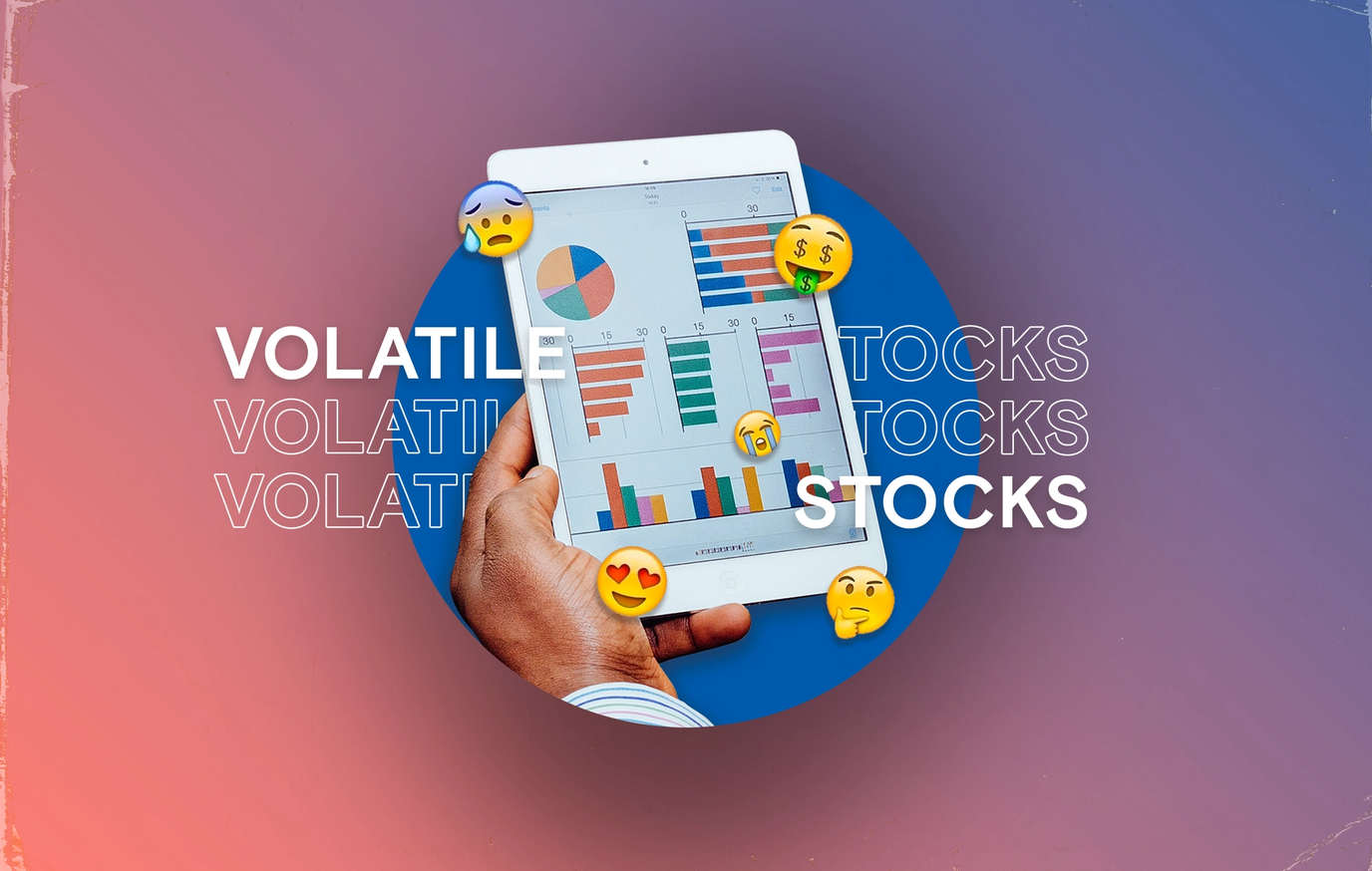
Rounding it up
New investors often shy away from investing in stocks because of a lack of information.
You can invest in stocks in Canada through three different accounts: Tax-Free Savings Accounts, Registered Retirement Savings Plans, and Registered Education Savings Plans.
Ideally, you should review both fundamental and technical parameters before investing in a stock.
You can invest in Canadian stocks through either a big bank trading platform or an online brokerage.
Investing in stocks is a common first step towards saving for the future. Part of making smart investments is understanding the potential risks and rewards. In the case of stock investing, one of those risks and rewards is volatility.
Volatility is rewarding when you understand it. If you do, you can use it to your advantage to boost your profits. In fact, once you get the hang of it, harnessing the power of volatility can even be fun. Without a thorough understanding, though, it can lead to missed opportunities or even financial loss — making it risky as well.
What is volatility?
To start on the right foot, it’s important to get a clear idea of the types of volatility and what each one means.
Market versus stock volatility
When most people say stock investing is volatile, they’re referring to market volatility. Market volatility simply means the extent to which the stock market goes up or down, more or less than average. So, a volatile market is one that moves more than it normally does.
Experts tend to check market volatility by looking at the S&P 500, which features the 500 biggest publicly traded stocks. The general consensus is that if it moves by more than 1% over a period, the market is volatile.
There is also stock volatility. As its name implies, this form of volatility focuses on the greater-than-normal movements of a specific stock.
Remember that normal market movements are not volatile. Individual stocks and the market as a whole both fluctuate during the day. Spotting volatility entails looking at longer periods.
SPEND SMARTER. SAVE FASTER
Implied versus historic volatility
When talking about market volatility, there are two main types:
Implied volatility predicts the future
Historic volatility looks back at the past volatility
Volatility brings risks and rewards
Volatility leads to both risks and rewards. After all, investors can’t buy low then sell high if a stock isn’t volatile enough to change prices.
Look at classic examples of successful companies, like Apple or Microsoft. Savvy Canadians who bought those stocks at low prices early on made huge profits. But those who invested too late couldn’t buy low, so they got lower profits.
How do investors measure volatility?
There are a few ways to measure volatility. The most common is to look at the Volatility Index (VIX). This index shows the predicted stock market volatility for the next 30 days. It is based on the S&P 500.
With some basic math skills, you can also learn how to calculate volatility of a certain stock yourself to make better investment decisions.
To do it by hand:
Find the prices of the stock during the chosen time period.
Calculate the average of the values.
Calculate each deviation from that mean.
Square all the deviations and add them. Divide this by how many numbers there were.
The result is the variance.
Anyone taking this approach should also consider calculating the standard deviation. That indicates the stock’s volatility, meaning how much it is likely to drift from the average. This is just the square root of the variance.
Other methods of measuring volatility include:
Beta – This looks at the volatility of a stock (or another security) compared to the market as a whole. When the beta is 1, the volatility of the stock is identical to that of the market. A beta above 1 indicates more movement than the market. A beta below 1 indicates less movement than the market.
Maximum drawdown – This is the biggest historical loss that a stock has had. It is within a given period and measures the entire drop from the peak down to the trough.
Uncertainty is a big reason for volatility
One of the major reasons that stock investing is volatile is due to the uncertainty. This simply means that people do not know what to expect from the market.
The uncertainty investors feel for the market can come from various factors, including:
Inflation rates
Monetary policies
Changes to interest rate taxes
Upcoming court decisions
Elections
Weather systems
Company news releases
When considering uncertainty as a cause for stock volatility, you should remember that stock markets tend to be highly emotional. As such, they frequently overreact compared to the likely change.
"Generally speaking, the stock market will react positively or negatively to political announcements, depending on how the government frames the revelation."
What causes uncertainty and volatility?
Most of the underlying reasons for stock investing volatility come down to the uncertainty in the market. So, Canadians can look at what causes uncertainty to see the reasons.
1. Economic indicators
It should come as no surprise that if economic indicators let us know that the market seems to be doing well, things will go better. After all, this reduces the feelings of uncertainty associated with the market.
On the other hand, if economic indicators show poor performance, it can reduce confidence and increase uncertainty. This can lead to drops in the market.
Some of the most important economic indicators include:
GDP calculations
Monthly job reports
Consumer spending
Inflation data
Federal government decisions
2. Politics
Politics has major impacts on the volatility of stock investing because of its worldwide importance. Politics directly affects the decisions that governments make regarding federal spending, taxes, trade agreements, and more.
Generally speaking, the stock market will react positively or negatively to political announcements, depending on how the government frames the revelation. If the government praises an upcoming change, the market will typically do better.
3. The global economy and events
Technology transcends national borders, which means the economy or current events of one country can affect those of others. Some of the international events that can contribute to volatility include:
Political upheaval
War
Regime changes
Rebellions
One good example of this would be Brexit. In the days after the Brexit vote, the Dow Jones Industrial Average dropped by almost 900 points. Much of this decrease came from uncertainty of the future of the global economy and the UK.
SPEND SMARTER. SAVE FASTER
4. Public relations and overall brand image
We’ve discussed the causes of market volatility. Investing in stocks also requires paying attention to what triggers stock-specific volatility.
The biggest factor that can affect the volatility of a specific stock is its overall branding and public relations. For example, reporting poor sales figures negatively affects the public image of the brand.
The importance of public relations can also mean that smaller news stories or anything involving the company can impact a stock’s volatility.
Expect a rise in stock prices if there is a new product that customers love or a strong earnings report. Expect a drop if there is a recall, data breach, or a scandal with an executive.
The stock market is volatile by nature
If you’re a new investor who’s just beginning to learn about stock investing volatility, you should remember that this is simply part of the nature of the market.
The potential profits of an investment vehicle go hand in hand. For example, bonds are riskier than cash, and stocks are riskier than bonds. Bonds have more potential for profit than cash, while stocks have a higher profit potential than the two.
In using the stock market, you want volatility to be there. It is that very volatility and risk that lead to greater potential profits.
Plus, if any given stock is currently volatile in the direction of a loss, you can likely minimize losses by not selling until it goes back up. Patience is a virtue.
How to take advantage of the volatility in stock investing
Savvy investors know that while volatility can be a risk, it can also be a profit-generating advantage. Keep the following tips in mind to take advantage of this volatility:
Start small to get a feel for the markets and volatility. Invest a small amount at first, and only in a few stocks
Try to keep emotion out of decisions
Create clear goals so you can decide between long- or short-term strategies
Research companies before investing in their stocks
With this advice in mind and a clearer understanding of the volatility of stock investing, you should hopefully be on the way to financial gain. Even a small investment can multiply thanks to volatility, so do your research and start investing. You can do it!

About the author
Cedric Jackson is a crypto writer, sharing his experience to educate and inform people about Bitcoin, cryptocurrency, and blockchain technology, aiming to provide a global perspective on the events shaping the development of the new crypto economy.
Read more about this author